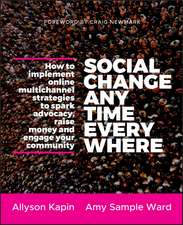Leading and Managing in the Social Sector: Strategies for Advancing Human Dignity and Social Justice: Management for Professionals
Editat de S. Aqeel Tirmizi, John D. Vogelsangen Limba Engleză Hardback – 2 ian 2017
This book explores leadership and management in social sector organizations, which include, NGOs, non-profits, social enterprises, social businesses, and cross-sector collaborations focusing on advancing human dignity and social justice. It provides social sector leaders with an overview of current trends, issues, and challenges in the field as well as best practices to foster effective programs, sustain organizations and meet the growing demands of the sector. The enclosed chapters cover topics such as cross-sector organizational design, innovation for client services, gender management dynamics, policy advocacy, and the growing social entrepreneurship movement.
The social sector is currently in a vibrant, dynamic, and exciting stage. The sector’s role and relevance to advancing human dignity and social justice is greater than ever. The number and types of social sector organizations have increased exponentially around the world and are offering extraordinary and much needed contributions toward an array of social issues. The traditional NGOs and non-profit organizations continue to be an integral part of the global civil society. At the same time, the emerging organizational forms under the social entrepreneurship umbrella are providing new momentum and excitement within and outside of the social sector. The interest in social entrepreneurship is encouraging existing social sector entities to actively embrace and encourage innovation. This interest is also inspiring a new breed of professionals and organizations to contribute to the social sector. This trend falls under the larger social sector dynamic promoting the creation of “hybrid” and emergent organizational forms, which cross and combine the traditional non-profit and for-profit domains.
Despite the increased interest, the socialsector still faces challenges around the world. CIVICUS – an international group promoting civil society organizations and groups-- recently reported a rise in the restrictions on civil society activities in a number of countries through worsening policy and legal environments. Funding challenges for the social sector are thus becoming more significant. At the same time, the calls for social sector accountability and emphasis on results and impact are growing. This book aims to offer approaches and tools which allow for the bridging of demands between creativity and accountability, between inspiration and results, and between gaining individual commitment and shared ownership of agendas and achievements, all of which are needed to effectively operate in the changing social sector.
| Toate formatele și edițiile | Preț | Express |
|---|---|---|
| Paperback (1) | 455.12 lei 6-8 săpt. | |
| Springer International Publishing – 7 iul 2018 | 455.12 lei 6-8 săpt. | |
| Hardback (1) | 534.17 lei 6-8 săpt. | |
| Springer International Publishing – 2 ian 2017 | 534.17 lei 6-8 săpt. |
Din seria Management for Professionals
- 17%
 Preț: 525.69 lei
Preț: 525.69 lei -
 Preț: 505.65 lei
Preț: 505.65 lei - 15%
 Preț: 542.04 lei
Preț: 542.04 lei -
 Preț: 500.84 lei
Preț: 500.84 lei - 15%
 Preț: 590.49 lei
Preț: 590.49 lei -
 Preț: 359.93 lei
Preț: 359.93 lei - 17%
 Preț: 458.99 lei
Preț: 458.99 lei - 17%
 Preț: 362.80 lei
Preț: 362.80 lei - 18%
 Preț: 909.65 lei
Preț: 909.65 lei - 15%
 Preț: 593.08 lei
Preț: 593.08 lei - 15%
 Preț: 637.59 lei
Preț: 637.59 lei - 19%
 Preț: 424.00 lei
Preț: 424.00 lei -
 Preț: 397.91 lei
Preț: 397.91 lei -
 Preț: 361.45 lei
Preț: 361.45 lei -
 Preț: 397.04 lei
Preț: 397.04 lei -
 Preț: 358.01 lei
Preț: 358.01 lei -
 Preț: 358.28 lei
Preț: 358.28 lei - 19%
 Preț: 486.24 lei
Preț: 486.24 lei - 17%
 Preț: 429.18 lei
Preț: 429.18 lei - 19%
 Preț: 425.83 lei
Preț: 425.83 lei - 17%
 Preț: 361.94 lei
Preț: 361.94 lei -
 Preț: 500.19 lei
Preț: 500.19 lei - 17%
 Preț: 427.49 lei
Preț: 427.49 lei -
 Preț: 274.03 lei
Preț: 274.03 lei -
 Preț: 307.65 lei
Preț: 307.65 lei - 20%
 Preț: 567.21 lei
Preț: 567.21 lei -
 Preț: 393.52 lei
Preț: 393.52 lei - 17%
 Preț: 362.16 lei
Preț: 362.16 lei -
 Preț: 395.39 lei
Preț: 395.39 lei - 17%
 Preț: 364.52 lei
Preț: 364.52 lei - 17%
 Preț: 526.72 lei
Preț: 526.72 lei - 15%
 Preț: 622.88 lei
Preț: 622.88 lei - 20%
 Preț: 633.82 lei
Preț: 633.82 lei -
 Preț: 396.76 lei
Preț: 396.76 lei - 17%
 Preț: 361.34 lei
Preț: 361.34 lei - 20%
 Preț: 567.21 lei
Preț: 567.21 lei - 19%
 Preț: 454.93 lei
Preț: 454.93 lei - 19%
 Preț: 521.25 lei
Preț: 521.25 lei -
 Preț: 356.80 lei
Preț: 356.80 lei - 17%
 Preț: 395.24 lei
Preț: 395.24 lei -
 Preț: 472.36 lei
Preț: 472.36 lei -
 Preț: 255.44 lei
Preț: 255.44 lei - 17%
 Preț: 458.94 lei
Preț: 458.94 lei - 17%
 Preț: 361.44 lei
Preț: 361.44 lei - 17%
 Preț: 362.33 lei
Preț: 362.33 lei - 17%
 Preț: 527.87 lei
Preț: 527.87 lei -
 Preț: 599.21 lei
Preț: 599.21 lei - 15%
 Preț: 426.05 lei
Preț: 426.05 lei - 18%
 Preț: 688.33 lei
Preț: 688.33 lei
Preț: 534.17 lei
Preț vechi: 628.44 lei
-15% Nou
Puncte Express: 801
Preț estimativ în valută:
102.25€ • 111.10$ • 85.94£
102.25€ • 111.10$ • 85.94£
Carte tipărită la comandă
Livrare economică 21 aprilie-05 mai
Preluare comenzi: 021 569.72.76
Specificații
ISBN-13: 9783319470443
ISBN-10: 3319470442
Pagini: 510
Ilustrații: XV, 288 p. 15 illus., 11 illus. in color.
Dimensiuni: 155 x 235 x 19 mm
Greutate: 0.6 kg
Ediția:1st ed. 2017
Editura: Springer International Publishing
Colecția Springer
Seria Management for Professionals
Locul publicării:Cham, Switzerland
ISBN-10: 3319470442
Pagini: 510
Ilustrații: XV, 288 p. 15 illus., 11 illus. in color.
Dimensiuni: 155 x 235 x 19 mm
Greutate: 0.6 kg
Ediția:1st ed. 2017
Editura: Springer International Publishing
Colecția Springer
Seria Management for Professionals
Locul publicării:Cham, Switzerland
Cuprins
Chapter 1 Introduction.- Part I: Fit for the Future: Leading Social Innovation.- Chapter 2 Leading Innovation in the Social Sector.- Chapter 3 Lessons from Muhammad Yunus and the Grameen Bank.- Chapter 4 Social Entrepreneurship: A Call for Collective Action.- Part II: Engaging Meaningfully in the Complex Social Context.- Chapter 5 Exploring the Real Work of Social Change.- Chapter 6 Policy Advocacy and Social Sector Organizations.- Chapter 7 Changes in the International Development Landscape.- Part III: Fostering Organization Resilience- Chapter 8 Learning for Purpose: Challenges and Opportunities of Human Capital Development in the Social Sector.- Chapter 9 The Next Level: Understanding Effective Board Development.- Chapter 10 Gender at Work: An Experiment in "Doing Gender".- Chapter 11 Intervening in Organizational Trauma.- Part IV: Leading in Social Sector Organizations.- Chapter 12 Women's Support Networks of Leadership Development.- Chapter 13 Frameworks, Tools and Leadership forResponding to Strategic Alliance Challenges.- Chapter 14 Complex Responsive Leading in Social Sector Organizations.- Part V: Measuring Success.- Chapter 15 Accounting for Outcomes: Monitoring and Evaluation in the Transnational NGO Sector.- Chapter 16 Conclusion.
Notă biografică
S. Aqeel Tirmizi, PhD, has over twenty-five years of experience in management teaching, training, consulting, and research in international settings. He is a Professor of Leadership and Management in the Graduate School of Leadership and Change at Antioch University. He also holds a visiting faculty position at the School for International Training. His work extensively deals with leadership development, cross-cultural management, change management, and leading social innovation. Aqeel holds a PhD in Management from the State University of New York – Binghamton. Throughout his professional career, Aqeel has undertaken a variety of training and consulting assignments for national and international organizations in the nonprofit, public, and private sectors. These assignments included work with the Ford Foundation, ChildFund International, Oxfam America, CARE USA, Women for Women International, Canadian International Development Agency, Heifer International, Eisenhower Fellows Program, BRAC, and The World Bank. His advisory and consulting work for the Ford Foundation International Fellowship Program included assignments with a number of partners in Mexico, The Netherlands, Thailand, the United Kingdom, and the United States. Aqeel’s research focuses on leadership, cross-cultural management, and social innovation. He has presented his work in several major international conferences in Asia, Europe, and North America. He is dedicated to mission-driven and result-oriented work across multiple sectors. He has in-depth expertise in adult learning and training and is certified in human systems development. In recognition of his contributions, Aqeel was selected in the 2013 CSC Leaders program under the auspices of HRH The Duke of Edinburgh’s Commonwealth Study Conferences.
John D. Vogelsang, PhD, has been consulting since 1979 in the areas of organizational and social change, conflict transformation, participatory evaluation, board development, strategic planning, and small and large group dialogue and deliberation facilitation. He works with social service and social change organizations, foundations, mental health agencies, community health centers, professional associations, universities, and religious judicatories. Some of his clients have included: The Hunger Project, Institute for Global Ethics, Association of Black Foundation Executives, New York State Developmental Disabilities Planning Council, Community Health Care Association of New York State, National Association for the Advancement of Psychoanalysis, Fiscal Policy Institute of New York State, and Hispanics in Philanthropy. He is the Director of the Michael Harrington Center for Democratic Values and Social Change and Director of the Dialogue Project for the Queens College/CUNY Center for Ethnic, Racial, and Religious Understanding. He is also an Adjunct Associate Professor in the American University MS program inOrganization Development. For two years, he was a visiting professor of organizational conflict transformation, and leading and managing nonprofits and NGOs at the School for International Training Graduate Institute. During his fourteen years with the Support Center for Nonprofit Management, he was a lead consultant and eventually the associate director. Since 2009, he has served as the Editor in Chief of the OD Practitioner, the quarterly journal of the Organization Development Network. He has published many articles and monographs, and co-edited two collections of articles. He is the 2013 recipient of the OD Network Larry Porter Award for communicating OD.
Textul de pe ultima copertă
This book explores leadership and management in social sector organizations, which include, NGOs, non-profits, social enterprises, social businesses, and cross-sector collaborations focusing on advancing human dignity and social justice. It provides social sector leaders with an overview of current trends, issues, and challenges in the field as well as best practices to foster effective programs, sustain organizations and meet the growing demands of the sector. The enclosed chapters cover topics such as cross-sector organizational design, innovation for client services, gender management dynamics, policy advocacy, and the growing social entrepreneurship movement.
The social sector is currently in a vibrant, dynamic, and exciting stage. The sector’s role and relevance to advancing human dignity and social justice is greater than ever. The numberand types of social sector organizations have increased exponentially around the world and are offering extraordinary and much needed contributions toward an array of social issues. The traditional NGOs and non-profit organizations continue to be an integral part of the global civil society. At the same time, the emerging organizational forms under the social entrepreneurship umbrella are providing new momentum and excitement within and outside of the social sector. The interest in social entrepreneurship is encouraging existing social sector entities to actively embrace and encourage innovation. This interest is also inspiring a new breed of professionals and organizations to contribute to the social sector. This trend falls under the larger social sector dynamic promoting the creation of “hybrid” and emergent organizational forms, which cross and combine the traditional non-profit and for-profit domains.
Despite the increased interest, the social sector still faces challenges around the world. CIVICUS – an international group promoting civil society organizations and groups-- recently reported a rise in the restrictions on civil society activities in a number of countries through worsening policy and legal environments. Funding challenges for the social sector are thus becoming more significant. At the same time, the calls for social sector accountability and emphasis on results and impact are growing. This book aims to offer approaches and tools which allow for the bridging of demands between creativity and accountability, between inspiration and results, and between gaining individual commitment and shared ownership of agendas and achievements, all of which are needed to effectively operate in the changing social sector.
Caracteristici
Examines the non-profit and NGO realm internationally through the lens of the social sector Provides an overview of the current trends, issues and challenges in the social sector Outlines strategies and practices to strengthen organizational work in governance, innovation, leading change, dealing with environmental and organizational complexity, talent and leadership development, policy advocacy and performance measurement Includes supplementary material: sn.pub/extras









